Ezfx.Csv
2.4.8
dotnet add package Ezfx.Csv --version 2.4.8
NuGet\Install-Package Ezfx.Csv -Version 2.4.8
<PackageReference Include="Ezfx.Csv" Version="2.4.8" />
paket add Ezfx.Csv --version 2.4.8
#r "nuget: Ezfx.Csv, 2.4.8"
// Install Ezfx.Csv as a Cake Addin #addin nuget:?package=Ezfx.Csv&version=2.4.8 // Install Ezfx.Csv as a Cake Tool #tool nuget:?package=Ezfx.Csv&version=2.4.8
CSV2Entity
Install
Install Core from Nuget
Instial Visual Studio Extension from marketplace
https://marketplace.visualstudio.com/items?itemName=EricZhou.int123
To view the introduce Video please visit:
What is CSV
CSV is the abbreviation of Comma-separated values, a file format stores tabular data in plain-text form, usually with .csv extension. CSV is a simple file format that is widely supported by consumer, business, and scientific applications.
Examples
Example of a USA/UK CSV file
Year,Make,Model,Length
1997,Ford,E350,2.34
2000,Mercury,Cougar,2.38
CSV Entity
In order to build CSV entities, we need something more. Csharp’s Attribute Mechanism provides us what we need by decorate CSV class properties with a custom attribute. Custom attribute defines CVS field’s display name and order. Here is the CsvFieldAttribute:
public class CsvFieldAttribute:Attribute
{
public string Name { get; set; }
public int Order { get; set; }
}
With CsvFieldAttribute, now we can decorate our own class.
[CsvObject(CodePage = 936, Description = "", HasHeader = true, Name = "")]
public class Car
{
[SystemCsvColumn(Name = "Year", Order = 0)]
public string Year { get; set; }
[SystemCsvColumn(Name = "Make", Order = 1)]
public string Make { get; set; }
[SystemCsvColumn(Name = "Model", Order = 2)]
public string Model { get; set; }
[SystemCsvColumn(Name = "Length", Order = 3)]
public string Length { get; set; }
}
Generate CSV Class
So, do we need to create CSV classes manually? Of cause not. So I developed the following tool to generate CSV classes:
To Generate CSV Classes, you have to install the VSIX file:
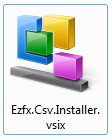
After the installation a new template called EZFX CSV Class will be displayed in your Visual Studio 2010 both in language VB and C#.
Add VB Class:
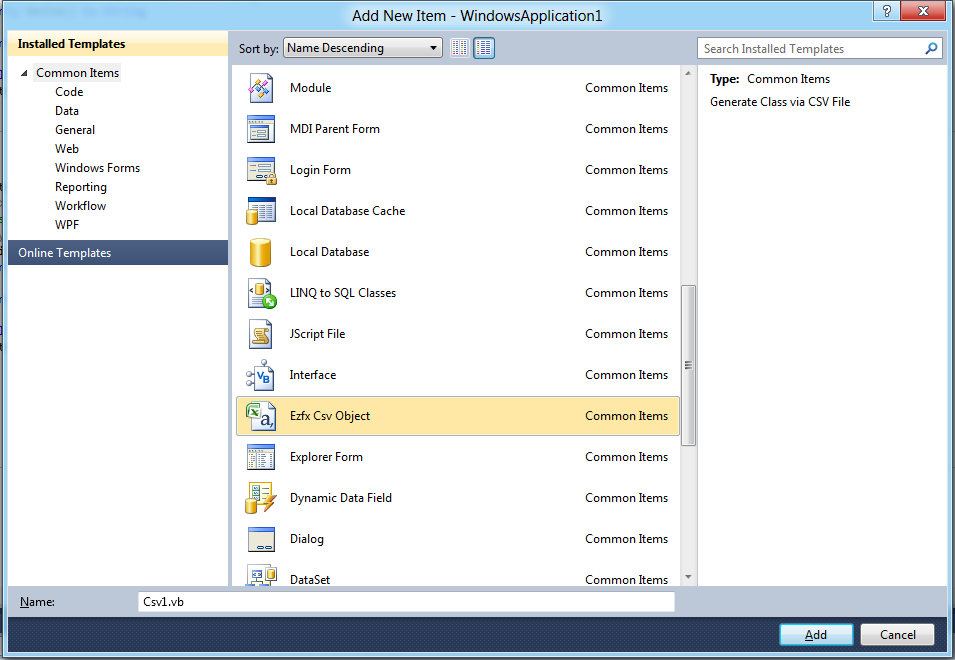
Add C# Class:
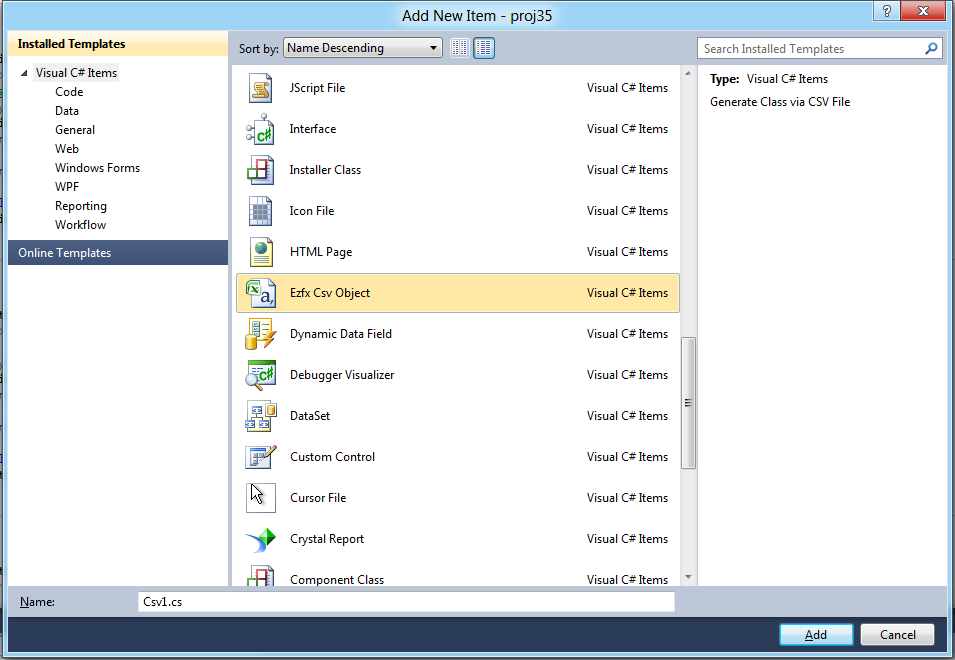
After click of add, a CSV Generation Wizard Window will be displayed, you can select a CSV file by click the browse button, this Wizard support Excel(xls, xlsx) and Access files(mdb, accdb), too. You specify the encoding for the CSV file and table name for Excel and Access file.
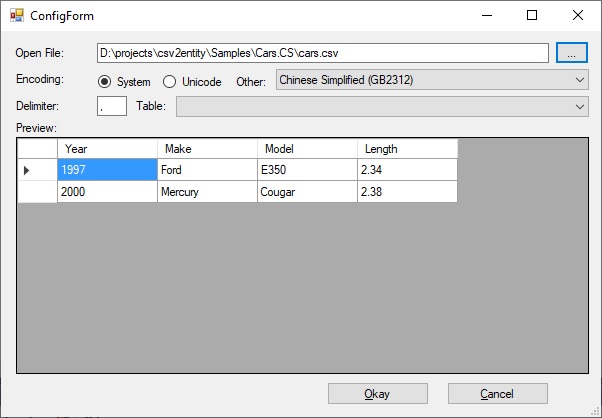
The following is the generated file:
The C# code:
using Ezfx.Csv;
namespace Cars.CS
{
[CsvObject(CodePage = 936, Description = "", HasHeader = true, Name = "", MappingType = CsvMappingType.Title, Delimiter = ",")]
public class CarCsv
{
/// <summary>
/// 0, Year
/// </summary>
[SystemCsvColumn(Name = "Year", Ordinal = 0, Alias = "")]
public string Year { get; set; }
/// <summary>
/// 1, Make
/// </summary>
[SystemCsvColumn(Name = "Make", Ordinal = 1, Alias = "")]
public string Make { get; set; }
/// <summary>
/// 2, Model
/// </summary>
[SystemCsvColumn(Name = "Model", Ordinal = 2, Alias = "")]
public string Model { get; set; }
/// <summary>
/// 3, Length
/// </summary>
[SystemCsvColumn(Name = "Length", Ordinal = 3, Alias = "")]
public string Length { get; set; }
}
}
The VB code:
Imports Ezfx.Csv
<CsvObject(CodePage:=936, Description:="", HasHeader:=True, MappingType:=Ezfx.Csv.CsvMappingType.Title, Name:="", Delimiter:=",")> _
Public Class CarCsv
''' <summary>
''' 0, Year
''' </summary>
<SystemCsvColumn(Alias:="", Ordinal:=0, Name:="Year")> _
Public Property Year() As String
''' <summary>
''' 1, Make
''' </summary>
<SystemCsvColumn(Alias:="", Ordinal:=1, Name:="Make")> _
Public Property Make() As String
''' <summary>
''' 2, Model
''' </summary>
<SystemCsvColumn(Alias:="", Ordinal:=2, Name:="Model")> _
Public Property Model() As String
''' <summary>
''' 3, Length
''' </summary>
<SystemCsvColumn(Alias:="", Ordinal:=3, Name:="Length")> _
Public Property Length() As String
End Class
CSV Read
The following code reads a csv file and put data to Csv Objects.
CarCsv[] imdbs = CsvContext.ReadFile<ImdbCsv>("cars.csv");
You can also provide csv content as a string
CarCsv[] imdbs = CsvContext.ReadContext<CarCsv>("...");
Document Generator
With Document Generator, you can get the schema of the CSV files or the Excel and Access files and save the result to a CSV file for further edit.
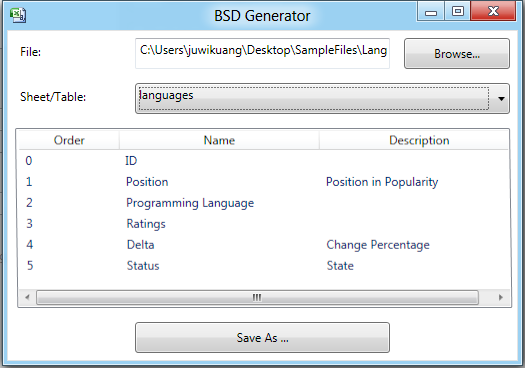
References
CSV in Wikipedia: http://en.wikipedia.org/wiki/Comma-separated_values
| Product | Versions Compatible and additional computed target framework versions. |
|---|---|
| .NET | net5.0 was computed. net5.0-windows was computed. net6.0 was computed. net6.0-android was computed. net6.0-ios was computed. net6.0-maccatalyst was computed. net6.0-macos was computed. net6.0-tvos was computed. net6.0-windows was computed. net7.0 was computed. net7.0-android was computed. net7.0-ios was computed. net7.0-maccatalyst was computed. net7.0-macos was computed. net7.0-tvos was computed. net7.0-windows was computed. net8.0 was computed. net8.0-android was computed. net8.0-browser was computed. net8.0-ios was computed. net8.0-maccatalyst was computed. net8.0-macos was computed. net8.0-tvos was computed. net8.0-windows was computed. |
| .NET Core | netcoreapp2.0 is compatible. netcoreapp2.1 is compatible. netcoreapp2.2 is compatible. netcoreapp3.0 was computed. netcoreapp3.1 was computed. |
| .NET Standard | netstandard2.0 is compatible. netstandard2.1 was computed. |
| .NET Framework | net35 is compatible. net40 is compatible. net403 was computed. net45 is compatible. net451 is compatible. net452 is compatible. net46 is compatible. net461 is compatible. net462 is compatible. net463 was computed. net47 is compatible. net471 is compatible. net472 is compatible. net48 was computed. net481 was computed. |
| MonoAndroid | monoandroid was computed. |
| MonoMac | monomac was computed. |
| MonoTouch | monotouch was computed. |
| Tizen | tizen40 was computed. tizen60 was computed. |
| Xamarin.iOS | xamarinios was computed. |
| Xamarin.Mac | xamarinmac was computed. |
| Xamarin.TVOS | xamarintvos was computed. |
| Xamarin.WatchOS | xamarinwatchos was computed. |
This package has no dependencies.
NuGet packages
This package is not used by any NuGet packages.
GitHub repositories
This package is not used by any popular GitHub repositories.
fixed export bugs
